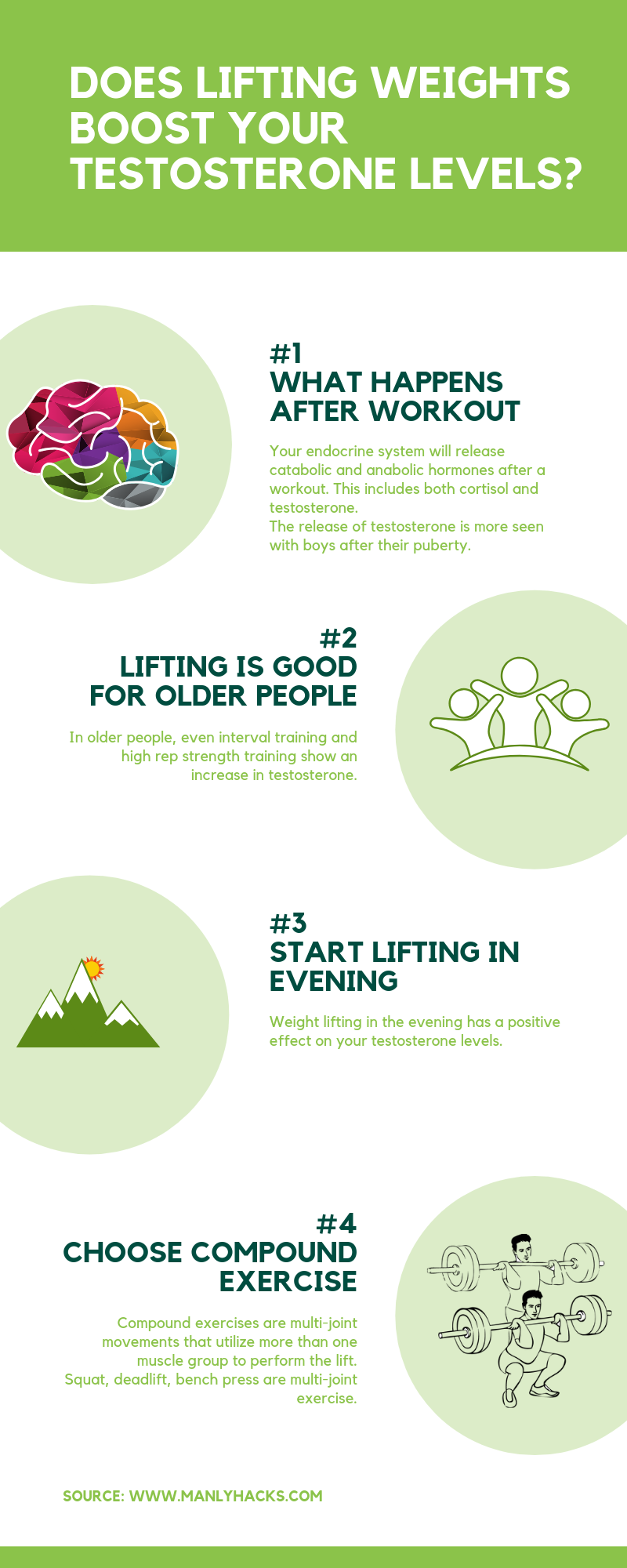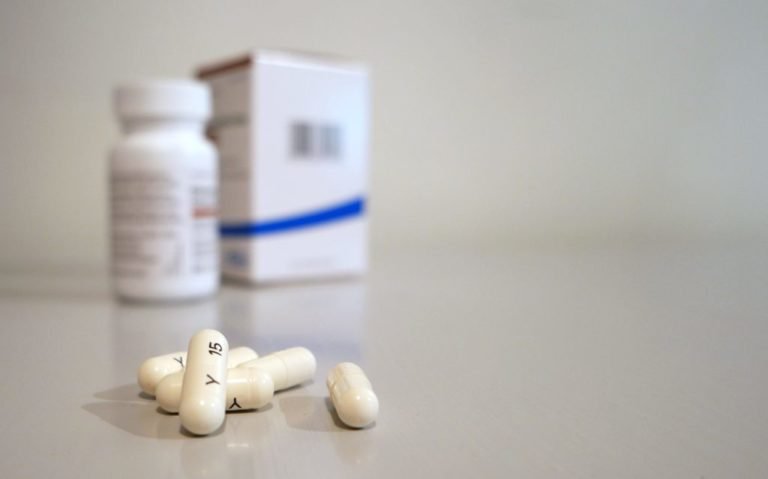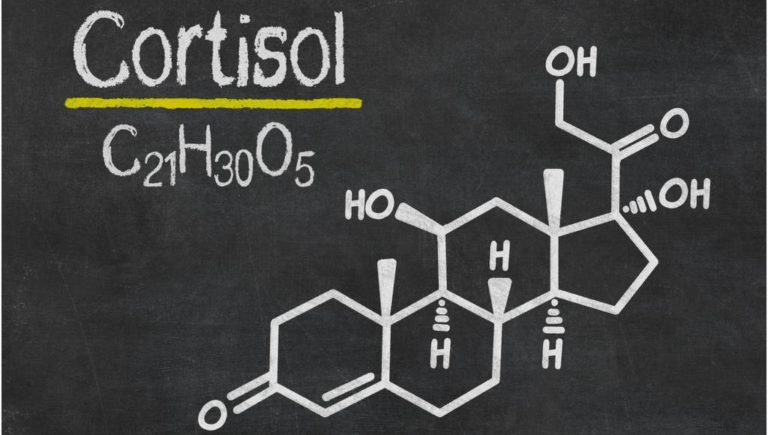Does lifting weights boost your Testosterone levels?
Exercise helps to boost your testosterone levels.
Testosterone helps to keep your muscle mass and limit the fat gain. As you age your testosterone levels will decline, it starts to decline at the age of 30. Without weight training and low testosterone levels will contribute to muscle loss.
Weight lifting is the best form of exercise to increase your testosterone levels.
Lifting heavy weights and HIIT will help to boost your testosterone levels.
HIIT
HIIT means high-intensity interval training. In HIIT you train at high intensity and low intensity at particular intervals.
For eg. In case of stair climber you train for 1min at the intensity of 5 another 1min for intensity 3 then 7 and 3 for 1min each. Continue for 20 min by gradually increasing the intensity.
My HIIT routine is
Intensity 5 * 1min; 3*1min
Intensity 5 * 1min; 3*1min
Intensity 8 * 1min; 4*1min
Intensity 8 * 1min; 4*1min
Intensity 10 * 1min; 5*1min
Intensity 12 * 1min; 6*1min
Intensity 14 * 1min; 6*1min
Intensity 16 * 1min; 8*1min
Intensity 18 * 1min; 10*1min
Intensity 20 * 1min; 10*1min
Chronic endurance training running or cycling for long hours can increase your stress level causing the release of cortisol hormone. Cortisol hormone triggers muscle breakdown. Try to avoid chronic endurance training for long hours. Try to limit the cardio to 30 minutes.
20 minutes HIIT will be beneficial for you. Cardio training for more than 30 minutes or 30 minutes can increase your cortisol hormone.
What is the best time to workout?
According to study evening is the best time to work out for your testosterone. Adding 10 min HIIT session in the morning will boost your metabolism. Weight lifting session in the evening is shown to have maximum testosterone boosting benefits.
What type of exercise gives the maximum benefits?
Even Moderate intensity high rep workout aimed at strength endurance showed that it would increase testosterone, growth hormone and cortisol levels.(Study 1)
Weight training will improve glucose intolerance.(Study 2) Both high and low-intensity workout will help to improve the glucose intolerance.
Testosterone is a major promoter of muscle growth. After a heavy resistance training your endocrine system will respond by secreting catabolic and anabolic hormones. Age and sex are an essential factor in determining the endocrine response. Before puberty, you will not experience an increase in testosterone after exercise. After puberty, there will be an increase in post-exercise testosterone levels.(Study 3)
Interval training shows a small but significant increase in basal testosterone levels in older people. (Study 4)
Incorporate compound multijoint exercise in your workout routine. Exercise like squats, deadlift, bench press, rows will utilize more muscles groups. The deadlift is a full body workout.
While choosing weights; choose wisely
Choose a weight with which you can just complete 4-8 reps. And do 3 -4 sets. Do 2 sets of warm-ups before attempting the heavy working sets.
The compound workouts utilize large muscle groups will be more beneficial for muscle growth and testosterone.
Workout routine
Day 1 |
|||
|
Workout |
Deadlift |
Chinup |
Kettlebell swing |
|
Sets |
5 |
3 |
3 |
|
Reps |
5 |
8 |
6 |
|
Rest period |
3-5 |
1-2 |
1-2 |
|
Tempo |
Moderate |
Moderate |
Explosive |
Day 2 |
|||
|
Workout |
Squat |
Clean and Jerk |
Barbell Rowing |
|
Sets |
5 |
3 |
4 |
|
Reps |
5 |
6 |
6 |
|
Rest period |
3-5 |
1-2 |
2-3 |
|
Tempo |
Moderate |
Explosive |
Moderate |
Day 3 |
|||
|
Workout |
Bench Press |
Shoulder Press |
Pushup |
|
Sets |
5 |
4 |
3 |
|
Reps |
5 |
6 |
10 |
|
Rest period |
3-5 |
2-3 |
1 |
|
Tempo |
Moderate |
Moderate |
Moderate |
Testosterone boosting workouts
Squat
Load the bar in a squat rack or power rack. Grab the bar tight and keep the barbell on the back of your shoulder. Keep both feet under the bar. Use hip extensors to de-rack the bar. Move 2 steps backward.
Squat lower while keeping your natural arch in the lower back. Lower until your upper thighs cross the parallel. Return to starting position and repeat.
Deadlift
Stand with your feet shoulder width apart. Grab the bar with a grip wider than shoulder width. Keep your chest up, this helps to keep your lower back in its natural arch. Pull the weight off the floor engaging your thighs, hips and glute muscles.
Try to keep the bar close to thighs(as if you were dragging the bar over the thigh muscles), once you reach the hip level return the bar to the floor.
Barbell Rowing
Place the barbell on the floor and stand with your feet shoulder width apart. Bent your body by flexing at the hips. Grab the bar then pull the bar towards your lower chest. Lower the bar to starting position, and repeat.
Bench press
Lie on the bench with your eyes under the bar. Grab the bar with a wider grip. De rack the bar and move it over your shoulders with your arms fully extended. This is your starting position. Lower the bar towards your middle chest, stop when your upper arms are parallel to the floor. Return to starting position and repeat.
Shoulder press
You can either do the workout in standing or sitting on a chair with back support. Grab the bar and bring it to your shoulder level. Press the bar by extension at your elbows — lower the bar to starting position and repeat.
Chin up
Grab the chin-up bar with a supinated grip, the palms facing towards you. Pull your body towards bar. When your chin reaches the bar pause and lowers your body and repeat.
Pushup
Clean and jerk
It can be said as a mix of the deadlift, squat, shoulder press did in an explosive manner. It improves lower body strength and upper strength and stability. It requires an article to write about the proper way of doing.
Kettlebell swing
One of the best exercise for your posterior muscles.

Share this Image On Your Site
Copy the code below
<p><strong>Please include attribution to https://manlyhacks.com/ with this graphic.</strong><br /><br /><a href=’https://manlyhacks.com/does-lifting-weights-boost-your-testosterone-levels/’><img src=’https://manlyhacks.com/wp-content/uploads/2019/04/Does-lifting-weights-boost-your.png’ alt=’Does lifting weights boost your testosterone ‘ width=’720′ border=’0’ /></a></p>
Share this Image On Your Site
Copy the code below
<p><strong>Please include attribution to https://manlyhacks.com/ with this graphic.</strong><br /><br /><a href=’https://manlyhacks.com/does-lifting-weights-boost-your-testosterone-levels/’><img src=’https://manlyhacks.com/wp-content/uploads/2019/04/testosterone-booting-workout-routine.png’ alt=’testosterone booting workout routine’ width=’720′ border=’0′ /></a></p>
Reference
- Smilios, I., Pilianidis, T., Karamouzis, M., Parlavantzas, A. and Tokmakidis, S. (2007). Hormonal Responses after a Strength Endurance Resistance Exercise Protocol in Young and Elderly Males. International Journal of Sports Medicine, [online] 28(5), pp.401-406. Available at: https://www.thieme-connect.de/products/ejournals/abstract/10.1055/s-2006-924366 [Accessed 18 Apr. 2019].
- Craig BW, e. (2019). The influence of high-resistance training on glucose tolerance in young and elderly subjects. – PubMed – NCBI. [online] Ncbi.nlm.nih.gov. Available at: https://www.ncbi.nlm.nih.gov/pubmed/2677535 [Accessed 18 Apr. 2019].
- Vingren, J., Kraemer, W., Ratamess, N., Anderson, J., Volek, J. and Maresh, C. (2010). Testosterone Physiology in Resistance Exercise and Training. Sports Medicine, [online] 40(12), pp.1037-1053. Available at: https://link.springer.com/article/10.2165%2F11536910-000000000-00000 [Accessed 18 Apr. 2019].
- Hayes, L. and Elliott, B. (2019). Short-Term Exercise Training Inconsistently Influences Basal Testosterone in Older Men: A Systematic Review and Meta-Analysis. Frontiers in Physiology, [online] 9. Available at: https://www.frontiersin.org/articles/10.3389/fphys.2018.01878/full [Accessed 18 Apr. 2019].







